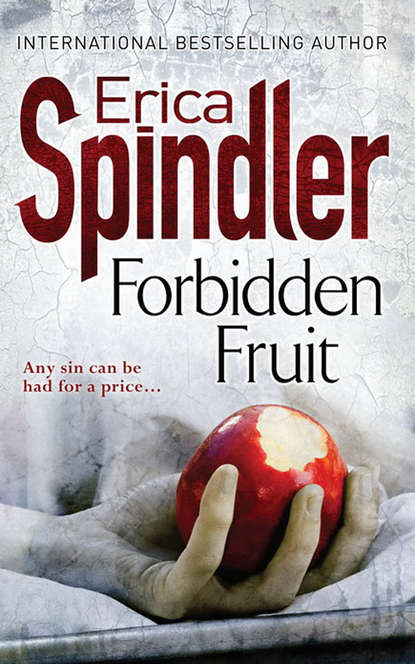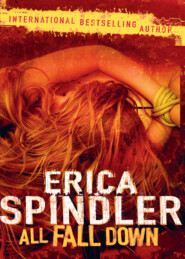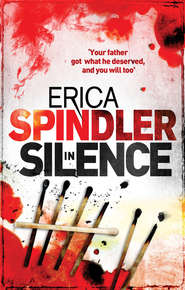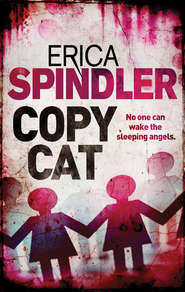По всем вопросам обращайтесь на: info@litportal.ru
(©) 2003-2024.
✖
Forbidden Fruit
Автор
Год написания книги
2018
Настройки чтения
Размер шрифта
Высота строк
Поля
Forbidden Fruit
Erica Spindler
Lead us not into temptation…
At fifteen, Victor Santos sneaks out to meet friends and returns home to find his mother murdered. But with only a half-eaten apple as their sole clue, the police fail to find the killer. Brooding with guilt and revenge, Victor encounters Glory, a girl unaware of her scandalous ancestry. Suffering at the hands of her controlling mother, Glory is desperate to discover the secrets and lies her mother is hiding the secrets and lies that Victor holds the key to.
Years later, the Snow White Killer’ is back in New Orleans, murdering prostitutes and leaving a gruesome calling card. Detective Victor Santos is on the case could it be that his mother’s killer has returned to slaughter once more?
A first-rate romantic thriller. Rendezvous
I can put Spindler on my growing list of favourite crime-fiction authors. Evening Standard
Erica Spindler is a master of suspense. Ulster Tatler
The author of over twenty-five books, Erica Spindler is best known for her spine-tingling thrillers. Her novels have been published all over the world, selling over eleven million copies, and critics have dubbed her stories “thrill-packed page turners, white-knuckle rides, and edge-of-your-seat whodunits.”
Erica is a New York Times and USA TODAY bestselling author. In 2002, her novel Bone Cold won the prestigious Daphne du Maurier Award for excellence.
Also by Erica Spindler
BREAKNECK
LAST KNOWN VICTIM
COPYCAT
KILLER TAKES ALL
SEE JANE DIE
IN SILENCE
DEAD RUN
BONE COLD
ALL FALL DOWN
CAUSE FOR ALARM
SHOCKING PINK
Forbidden Fruit
By Erica Spindler
www.mirabooks.co.uk (http://www.mirabooks.co.uk/)
To Melissa Senate For all the years and all the books
Acknowledgements
My heartfelt thanks to the following people for their part in bringing Forbidden Fruit to life:
Linda Kay West
Lieutenant John Jackson
Sergeant Michael Pfeiffer
Metsy Hingle
Jan Hamilton Powell
Karen Stone
Cary Weissert
Dianne Moggy
Melissa Senate
Nathan Hoffman
Evan Marshall and MIRA Books
Part 1 Hope
Prologue
Vacherie, Louisiana 1959
Hope Pierron sat in the window seat of her third floor bedroom and gazed out at the Mississippi River. She smiled to herself, anxiousness and excitement coiling in the pit of her gut. She controlled both with icy determination. She had waited all her life for this day; now that it had come, she would not reveal herself by appearing too eager.
She pressed a hand to the sun-warmed glass, wishing she could break it, leap out and fly to freedom. How many times during her fourteen years, years spent trapped within the red walls of this house, had she wished the same thing? To be a bird, to leap from the window and fly to freedom?
After today, she wouldn’t need to wish for wings. After today, she would be free of this house. Of the stigma of sin. Free of her mother and all who she had known.
Today she would be reborn.
Hope closed her eyes, thinking of her future, yet picturing her past and this hated house, instead. The Pierron House had been a fixture on River Road, a part of the culture of southern Louisiana since the summer of 1917. That had been just before the demise of Storyville, when her grandmother Camellia, the first Pierron madam, had moved her daughter and her girls here.
Surprisingly, neither hue nor cry had erupted then, nor when the gentlemen began calling. All these years later, this house, the activities within, were still accepted, just as the heat and mosquitos of August were accepted—with resigned dismay and sugar-sweet disdain.
Hope supposed one could expect no less; after all, this was Louisiana, a place where food, drink and other sensory intoxicants were as much a part of day-to-day living as mass and confession. Louisianians accepted their penance with as much joie de vivre as they did their pleasure; they understood that in a strange way, The Pierron House represented both.
The building itself, a Greek Revival structure with twenty-eight imposing Doric columns and sweeping wraparound galleries, was an architectural wonder. Ironically, when the afternoon sun struck it just so, the house glowed a virginal, almost holy white. When the sun set, however, the illusion of holiness ended. The house came alive with the music of men the likes of Jelly Roll Morton and Tony Jackson, the walls rang with the laughter of those who had come to taste the forbidden fruit and of those who sold it.
Every evening of her life she had been forced to hear that laughter, had been forced to witness the regularity with which her mother’s girls led their gentlemen up the serpentine staircase. Cloaked in a sinfully plush, bloodred carpet, those stairs led to the six large bedrooms on the second floor, bedrooms outfitted opulently with silks and brocades and large, soft beds.
Erica Spindler
Lead us not into temptation…
At fifteen, Victor Santos sneaks out to meet friends and returns home to find his mother murdered. But with only a half-eaten apple as their sole clue, the police fail to find the killer. Brooding with guilt and revenge, Victor encounters Glory, a girl unaware of her scandalous ancestry. Suffering at the hands of her controlling mother, Glory is desperate to discover the secrets and lies her mother is hiding the secrets and lies that Victor holds the key to.
Years later, the Snow White Killer’ is back in New Orleans, murdering prostitutes and leaving a gruesome calling card. Detective Victor Santos is on the case could it be that his mother’s killer has returned to slaughter once more?
A first-rate romantic thriller. Rendezvous
I can put Spindler on my growing list of favourite crime-fiction authors. Evening Standard
Erica Spindler is a master of suspense. Ulster Tatler
The author of over twenty-five books, Erica Spindler is best known for her spine-tingling thrillers. Her novels have been published all over the world, selling over eleven million copies, and critics have dubbed her stories “thrill-packed page turners, white-knuckle rides, and edge-of-your-seat whodunits.”
Erica is a New York Times and USA TODAY bestselling author. In 2002, her novel Bone Cold won the prestigious Daphne du Maurier Award for excellence.
Also by Erica Spindler
BREAKNECK
LAST KNOWN VICTIM
COPYCAT
KILLER TAKES ALL
SEE JANE DIE
IN SILENCE
DEAD RUN
BONE COLD
ALL FALL DOWN
CAUSE FOR ALARM
SHOCKING PINK
Forbidden Fruit
By Erica Spindler
www.mirabooks.co.uk (http://www.mirabooks.co.uk/)
To Melissa Senate For all the years and all the books
Acknowledgements
My heartfelt thanks to the following people for their part in bringing Forbidden Fruit to life:
Linda Kay West
Lieutenant John Jackson
Sergeant Michael Pfeiffer
Metsy Hingle
Jan Hamilton Powell
Karen Stone
Cary Weissert
Dianne Moggy
Melissa Senate
Nathan Hoffman
Evan Marshall and MIRA Books
Part 1 Hope
Prologue
Vacherie, Louisiana 1959
Hope Pierron sat in the window seat of her third floor bedroom and gazed out at the Mississippi River. She smiled to herself, anxiousness and excitement coiling in the pit of her gut. She controlled both with icy determination. She had waited all her life for this day; now that it had come, she would not reveal herself by appearing too eager.
She pressed a hand to the sun-warmed glass, wishing she could break it, leap out and fly to freedom. How many times during her fourteen years, years spent trapped within the red walls of this house, had she wished the same thing? To be a bird, to leap from the window and fly to freedom?
After today, she wouldn’t need to wish for wings. After today, she would be free of this house. Of the stigma of sin. Free of her mother and all who she had known.
Today she would be reborn.
Hope closed her eyes, thinking of her future, yet picturing her past and this hated house, instead. The Pierron House had been a fixture on River Road, a part of the culture of southern Louisiana since the summer of 1917. That had been just before the demise of Storyville, when her grandmother Camellia, the first Pierron madam, had moved her daughter and her girls here.
Surprisingly, neither hue nor cry had erupted then, nor when the gentlemen began calling. All these years later, this house, the activities within, were still accepted, just as the heat and mosquitos of August were accepted—with resigned dismay and sugar-sweet disdain.
Hope supposed one could expect no less; after all, this was Louisiana, a place where food, drink and other sensory intoxicants were as much a part of day-to-day living as mass and confession. Louisianians accepted their penance with as much joie de vivre as they did their pleasure; they understood that in a strange way, The Pierron House represented both.
The building itself, a Greek Revival structure with twenty-eight imposing Doric columns and sweeping wraparound galleries, was an architectural wonder. Ironically, when the afternoon sun struck it just so, the house glowed a virginal, almost holy white. When the sun set, however, the illusion of holiness ended. The house came alive with the music of men the likes of Jelly Roll Morton and Tony Jackson, the walls rang with the laughter of those who had come to taste the forbidden fruit and of those who sold it.
Every evening of her life she had been forced to hear that laughter, had been forced to witness the regularity with which her mother’s girls led their gentlemen up the serpentine staircase. Cloaked in a sinfully plush, bloodred carpet, those stairs led to the six large bedrooms on the second floor, bedrooms outfitted opulently with silks and brocades and large, soft beds.











